Unit 6 TV programmes Study skills 课件 (共24张PPT) 牛津译林版九年级英语上册
文档属性
| 名称 | Unit 6 TV programmes Study skills 课件 (共24张PPT) 牛津译林版九年级英语上册 |  | |
| 格式 | pptx | ||
| 文件大小 | 697.6KB | ||
| 资源类型 | 教案 | ||
| 版本资源 | 牛津译林版 | ||
| 科目 | 英语 | ||
| 更新时间 | 2025-01-25 13:46:51 | ||
图片预览

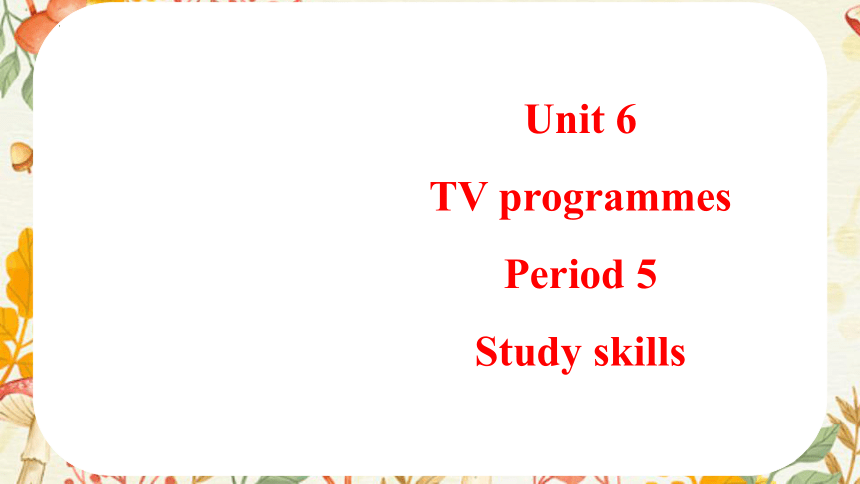
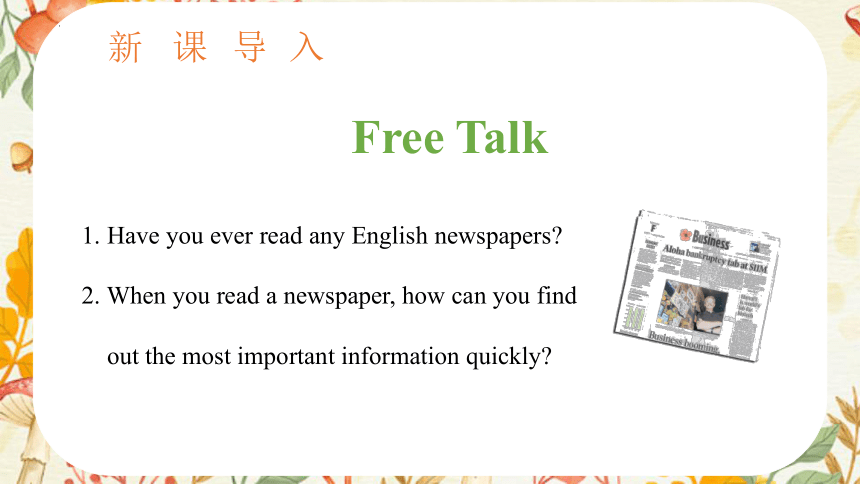
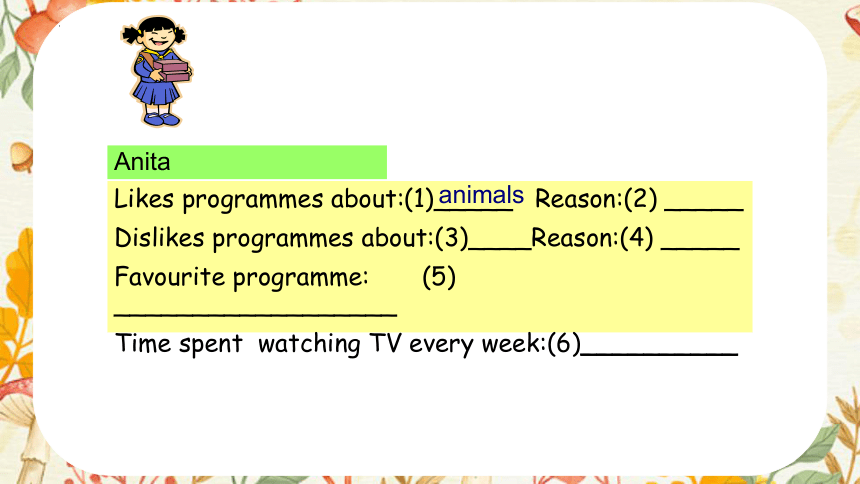
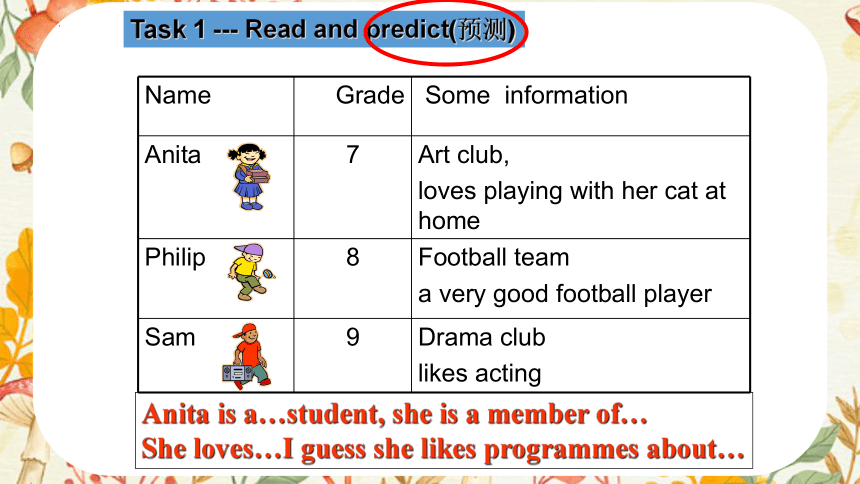
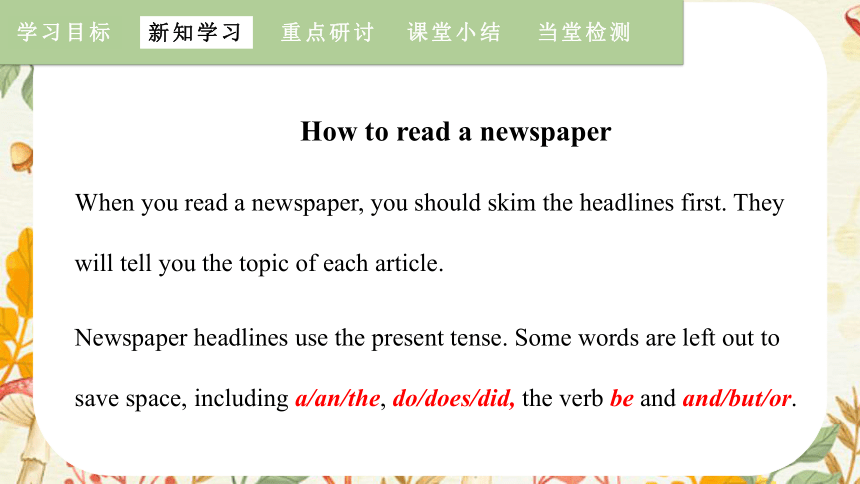

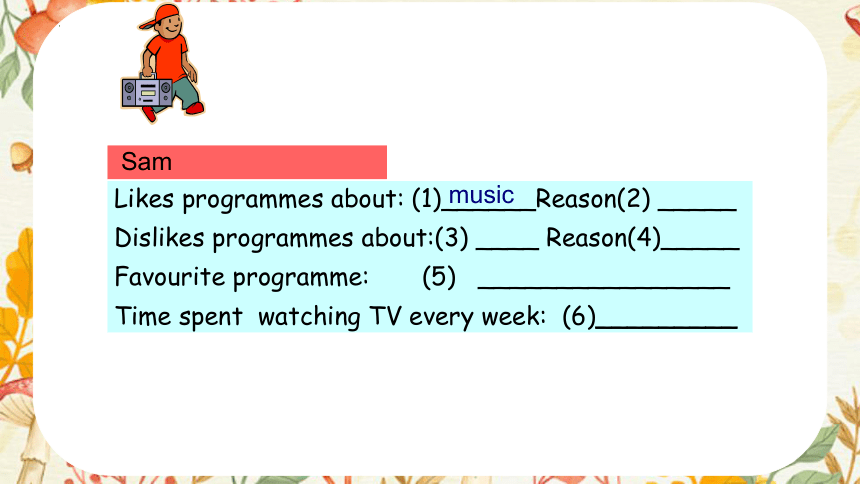
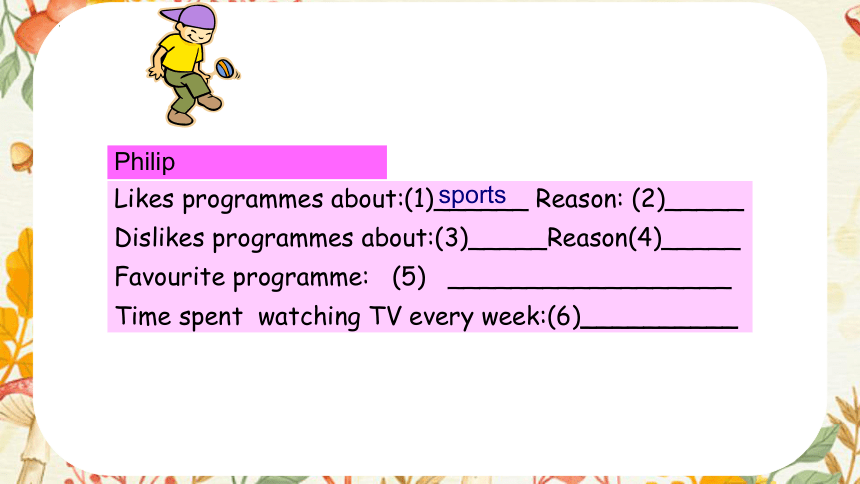
文档简介
(共24张PPT)
牛津译林版九年级英语上册
Unit 6 TV programmes Study skills
Unit 6
TV programmes
Period 5
Study skills
新
课
导
入
Free Talk
1. Have you ever read any English newspapers
2. When you read a newspaper, how can you find
out the most important information quickly
Likes programmes about:(1)_____ Reason:(2) _____
Dislikes programmes about:(3)____Reason:(4) _____
Favourite programme: (5) __________________
Time spent watching TV every week:(6)__________
Anita
animals
Name Grade Some information
Anita 7 Art club,
loves playing with her cat at home
Philip 8 Football team
a very good football player
Sam 9 Drama club
likes acting
Anita is a…student, she is a member of…
She loves…I guess she likes programmes about…
Task 1 --- Read and predict(预测)
新知学习
课堂小结
当堂检测
学习目标
重点研讨
When you read a newspaper, you should skim the headlines first. They will tell you the topic of each article.
How to read a newspaper
Newspaper headlines use the present tense. Some words are left out to save space, including a/an/the, do/does/did, the verb be and and/but/or.
Language Goal
新知学习
课堂小结
当堂检测
学习目标
重点研讨
能了解如何阅读报纸。
Likes programmes about: (1)______Reason(2) _____
Dislikes programmes about:(3) ____ Reason(4)_____
Favourite programme: (5) ________________
Time spent watching TV every week: (6)_________
Sam
music
Likes programmes about:(1)______ Reason: (2)_____
Dislikes programmes about:(3)_____Reason(4)_____
Favourite programme: (5) __________________
Time spent watching TV every week:(6)__________
Philip
sports
Task 2 --- listen and take notes
Tips2:listen carefully and use the short forms of the words
Millie is interviewing the students. Listen carefully and help her complete the notes below.
Anita
Likes programmes about:(1) __________ Reason: (2)_______________
Dislikes programmes about: (3)________ Reason:(4) ______________
Favourite programme: (5)__________________________
Time spent watching TV every week: (6)_______________
1. Popular poet passes away
pass away 意为“去世”
e.g. The old man passed away
peacefully last week.
这个老人上个星期很安详地离世了。
Language points
Useful phrases and expressions
1. interview sb. = have an interview with sb. 采访某人
2. be different from each other 彼此不同
3. a waste of time 浪费时间
4. life in the countryside 农村的生活
5. grow up listening to her poems 听着她的诗歌长大
6. on the radio 通过收音机
Anita
Likes programmes about:(1) __________ Reason: (2)_______________
Dislikes programmes about: (3)________ Reason:(4) ______________
Favourite programme: (5)__________________________
Time spent watching TV every week: (6)_______________
animals
interesting
cooking
boring
Animal Watch
one and a half hours
2. Susan Hunter, …, died of cancer on Tuesday in London.
die of “因......而死” ,主要指情感、冻、饿、疾病、衰老等自身的原因,后常加这样的名词。
如: die of illness (heart trouble, cancer, a fever, hunger, cold, poison, old age, thirst, sorrow, etc.)
辨析:die from 与 die of
die from “由于......而死”(死因不是存在人体之内或之上,而是由环境造成的,主要指事故等方面的外部原因),后常加这样的名词。
如: die from an earthquake (a traffic accident, a lightning, wound, lack of food, over work, carelessness, drinking, some unknown cause, etc.)
用die of或die from填空。
1. A lot of people _________ the earthquake.
2. The young lady _________ serious blood disease.
died from
died of
3.Habit的用法:
habit是可数名词,意为“习惯,习性”,
have the habit of 意为“有...的习惯”。
You need to change your eating habit.你得改变你的饮食习惯。
I’ve got into the habit of turning on the TV as soon as I get home.
我习惯一回家就打开电视。
注意:
“...的习惯”应用“the habit of+动词ing形式,不可接动词不定式”。
拓展:
habit (n.)习性,惯常行为,为不可数名词。
I only do it out of habit.我这么做只是出于习惯。
4. silly的用法:
Silly 是形容词,意为“傻的,愚蠢的。糊涂的”,其反义词是clever/bright/wise.
He’s so silly.
他太傻了。
注意:
Silly 的比较级是sillier, 最高级是silliest.
2.Why does Millie think so?
Because she thinks some of them are really creative.
3.Does Simon agree with Millie? Why or why not?
No, he doesn’t.Because he thinks watching TV ads is just a waste of time.
◎学法指导:在听录音之前可以先仔细阅读问题,推测对话中可能呈现的形式,有助于提高答题准确率。
Because she thinks some of them are really creative.
No, he doesn’t.Because he thinks watching TV ads is just a
waste of time.
听力训练
·导学建议·
先引导学生完成A2和A3部分的听力训练,再完成下面的练习。
听B部分对话,回答问题。
1.Does Millie think TV ads are interesting?
Yes, she does.
Yes, she does.
silly 意为“傻的”,用于修饰人时,一般指头脑简单、不懂事;常用于修饰言行,一般指“无聊的”。
foolish 意为“愚蠢的”,用于修饰人时,着重指无头脑,缺乏智慧或判断力;用于修饰行为时,指愚蠢或考虑不周的举动。
stupid 意为“笨的”,用于修饰人或事时,着重指生性迟钝或反应迟钝,有时是中性词。
辨析:silly/foolish/stupid
自制手抄报
·导学建议·
引导学生去图书馆或通过网络等途径获得一些英语报纸,并观察报纸的标题、图片等内容。
和同伴一起,制作一份英语报纸。
Watching TV ads is just a waste of time.看电视广告仅仅是浪费时间。
◎观察思考:
We shouldn’t waste time on such a small thing.我们不应该在一件这么小的事情上浪费时间。
He wastes a lot of time playing computer games.他浪费了许多时间玩游戏。
◎用法总结:
waste作名词,意为“浪费”,常用短语a waste of time意为“浪费时间”。waste还可作动词,意为“浪费;消耗”,后面可直接跟名词和代词作宾语。waste time/ money on sth./ (in) doing sth.,意为“(在)做某事上浪费时间/金钱”。
牛津译林版九年级英语上册
Unit 6 TV programmes Study skills
Unit 6
TV programmes
Period 5
Study skills
新
课
导
入
Free Talk
1. Have you ever read any English newspapers
2. When you read a newspaper, how can you find
out the most important information quickly
Likes programmes about:(1)_____ Reason:(2) _____
Dislikes programmes about:(3)____Reason:(4) _____
Favourite programme: (5) __________________
Time spent watching TV every week:(6)__________
Anita
animals
Name Grade Some information
Anita 7 Art club,
loves playing with her cat at home
Philip 8 Football team
a very good football player
Sam 9 Drama club
likes acting
Anita is a…student, she is a member of…
She loves…I guess she likes programmes about…
Task 1 --- Read and predict(预测)
新知学习
课堂小结
当堂检测
学习目标
重点研讨
When you read a newspaper, you should skim the headlines first. They will tell you the topic of each article.
How to read a newspaper
Newspaper headlines use the present tense. Some words are left out to save space, including a/an/the, do/does/did, the verb be and and/but/or.
Language Goal
新知学习
课堂小结
当堂检测
学习目标
重点研讨
能了解如何阅读报纸。
Likes programmes about: (1)______Reason(2) _____
Dislikes programmes about:(3) ____ Reason(4)_____
Favourite programme: (5) ________________
Time spent watching TV every week: (6)_________
Sam
music
Likes programmes about:(1)______ Reason: (2)_____
Dislikes programmes about:(3)_____Reason(4)_____
Favourite programme: (5) __________________
Time spent watching TV every week:(6)__________
Philip
sports
Task 2 --- listen and take notes
Tips2:listen carefully and use the short forms of the words
Millie is interviewing the students. Listen carefully and help her complete the notes below.
Anita
Likes programmes about:(1) __________ Reason: (2)_______________
Dislikes programmes about: (3)________ Reason:(4) ______________
Favourite programme: (5)__________________________
Time spent watching TV every week: (6)_______________
1. Popular poet passes away
pass away 意为“去世”
e.g. The old man passed away
peacefully last week.
这个老人上个星期很安详地离世了。
Language points
Useful phrases and expressions
1. interview sb. = have an interview with sb. 采访某人
2. be different from each other 彼此不同
3. a waste of time 浪费时间
4. life in the countryside 农村的生活
5. grow up listening to her poems 听着她的诗歌长大
6. on the radio 通过收音机
Anita
Likes programmes about:(1) __________ Reason: (2)_______________
Dislikes programmes about: (3)________ Reason:(4) ______________
Favourite programme: (5)__________________________
Time spent watching TV every week: (6)_______________
animals
interesting
cooking
boring
Animal Watch
one and a half hours
2. Susan Hunter, …, died of cancer on Tuesday in London.
die of “因......而死” ,主要指情感、冻、饿、疾病、衰老等自身的原因,后常加这样的名词。
如: die of illness (heart trouble, cancer, a fever, hunger, cold, poison, old age, thirst, sorrow, etc.)
辨析:die from 与 die of
die from “由于......而死”(死因不是存在人体之内或之上,而是由环境造成的,主要指事故等方面的外部原因),后常加这样的名词。
如: die from an earthquake (a traffic accident, a lightning, wound, lack of food, over work, carelessness, drinking, some unknown cause, etc.)
用die of或die from填空。
1. A lot of people _________ the earthquake.
2. The young lady _________ serious blood disease.
died from
died of
3.Habit的用法:
habit是可数名词,意为“习惯,习性”,
have the habit of 意为“有...的习惯”。
You need to change your eating habit.你得改变你的饮食习惯。
I’ve got into the habit of turning on the TV as soon as I get home.
我习惯一回家就打开电视。
注意:
“...的习惯”应用“the habit of+动词ing形式,不可接动词不定式”。
拓展:
habit (n.)习性,惯常行为,为不可数名词。
I only do it out of habit.我这么做只是出于习惯。
4. silly的用法:
Silly 是形容词,意为“傻的,愚蠢的。糊涂的”,其反义词是clever/bright/wise.
He’s so silly.
他太傻了。
注意:
Silly 的比较级是sillier, 最高级是silliest.
2.Why does Millie think so?
Because she thinks some of them are really creative.
3.Does Simon agree with Millie? Why or why not?
No, he doesn’t.Because he thinks watching TV ads is just a waste of time.
◎学法指导:在听录音之前可以先仔细阅读问题,推测对话中可能呈现的形式,有助于提高答题准确率。
Because she thinks some of them are really creative.
No, he doesn’t.Because he thinks watching TV ads is just a
waste of time.
听力训练
·导学建议·
先引导学生完成A2和A3部分的听力训练,再完成下面的练习。
听B部分对话,回答问题。
1.Does Millie think TV ads are interesting?
Yes, she does.
Yes, she does.
silly 意为“傻的”,用于修饰人时,一般指头脑简单、不懂事;常用于修饰言行,一般指“无聊的”。
foolish 意为“愚蠢的”,用于修饰人时,着重指无头脑,缺乏智慧或判断力;用于修饰行为时,指愚蠢或考虑不周的举动。
stupid 意为“笨的”,用于修饰人或事时,着重指生性迟钝或反应迟钝,有时是中性词。
辨析:silly/foolish/stupid
自制手抄报
·导学建议·
引导学生去图书馆或通过网络等途径获得一些英语报纸,并观察报纸的标题、图片等内容。
和同伴一起,制作一份英语报纸。
Watching TV ads is just a waste of time.看电视广告仅仅是浪费时间。
◎观察思考:
We shouldn’t waste time on such a small thing.我们不应该在一件这么小的事情上浪费时间。
He wastes a lot of time playing computer games.他浪费了许多时间玩游戏。
◎用法总结:
waste作名词,意为“浪费”,常用短语a waste of time意为“浪费时间”。waste还可作动词,意为“浪费;消耗”,后面可直接跟名词和代词作宾语。waste time/ money on sth./ (in) doing sth.,意为“(在)做某事上浪费时间/金钱”。
